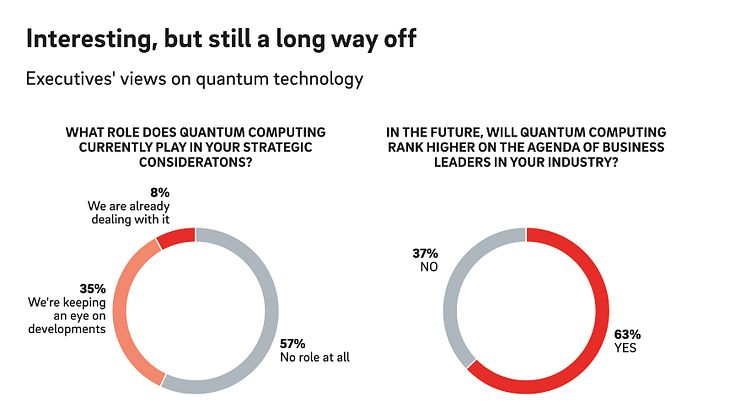
Press release -
Companies anticipate significant impact of quantum computing on business models
- Quantum technology will bring new disruptions
- Solving optimization problems will be one of the first use cases; manufacturing industries such as automotive, pharmaceuticals and chemicals will benefit most
- Rising investments indicate promising development towards commercialization; first markets for the technology already exist
Munich, May 2021: Quantum computing is likely to have an increasing impact on companies and their business models in the coming decade. This is one of the findings of a study by Roland Berger of 110 executives across a broad range of industries Europe-wide. The majority of respondents expect the ultra-fast computing technology to bring significant changes, either because it accelerates ongoing digital transformation (42%) or because it triggers new disruptions (23%). As a result, 63% intend to give the subject greater prominence in their strategic planning.
So far, quantum technology is only a secondary topic on the management agenda: Just 8% of the surveyed executives already specifically include the expected change in their strategic planning. Another 35% say they are at least keeping an eye on developments. "This reticence is understandable, as it will be some time before we see the commercial benefits of quantum computing," says Martin Streichfuß, Partner at Roland Berger and co-author of the study. "But we still think it makes sense to start considering the new technology and its potential applications early. The fact that the majority of our survey participants intend to do so is a very good sign."
Quantum computing is a key future technology
Quantum computing could have many different applications. The Roland Berger experts consider four main use cases for the ultra-fast computers to be commercially relevant: 1) solving optimization problems for which classical computers often take a very long time; 2) simulations of complex structures; 3) artificial intelligence and machine learning; and 4) cryptography. "More use cases will certainly be discovered as time goes by," says Michael Alexander, Partner and co-head of Roland Berger's Advanced Technology Center. "As with any new technology, once it is being tested by a wider range of users, quantum computing will find application in areas we cannot even conceive of today."
Automotive, pharmaceutical and chemical sectors likely to benefit
Which industries are most likely to benefit from the new ultra-fast computing capacities depends primarily on the data intensity of their business model: "It is a question of the volume of data you have, how diverse it is and how fast it needs to be processed," says Frederik Hammermeister, Partner at Roland Berger. "We expect manufacturing business models and supply chains to benefit the most from quantum computing, such as those in automotive, pharmaceuticals and chemicals, but it will also create new opportunities in areas like finance and transportation."
Quantum computers could be used to model the chemical processes inside batteries, which would enable the production of more efficient batteries for electric vehicles. Or they could train software, artificial intelligence and machine learning systems on a completely new level and thereby improve applications such as autonomous driving or the automatic detection of diseases like cancer. And in the finance industry they could solve complex optimization problems that are beyond the capacities of even the largest supercomputers today.
The way of working with chemicals and active substances could be revolutionized, too: "Tests that used to take years could suddenly become possible in a fraction of the time thanks to quantum simulation of molecular structures or analysis of their properties," says Alexander. "That would enormously speed up and simplify the discovery of new drugs and materials."
Public and private investment on a massive scale
No one can seriously predict when the technological breakthrough in quantum computing will come. But an interesting market environment is already developing for the technology. Partly, this is due to some very high levels of public funding: Countries around the world are investing a total of EUR 22 billion in research programs for quantum technologies, with China (10 billion), Germany (3.1 billion) and France (1.6 billion) spending the most. That is because quantum technology is now classified as critical infrastructure. And this is encouraging private finance: The number of venture capital transactions in the field of quantum applications has reached a historic peak – a sign that more and more investors are expecting commercial deployment in the not too distant future.
What that means for companies is that they need to be keeping a very close eye on progress and milestones in the field and they should develop scenarios for how quantum technology will potentially impact their own business. "Notwithstanding all the uncertainty around exactly when and how quantum technology will happen, we think business leaders should be looking into it as a matter of urgency," says Streichfuß. "Anyone who has ever carried out a comprehensive transformation program in their organization knows that change takes time. Those who start in time can create competitive advantages for their companies."
Topics
Roland Berger is the only management consultancy of European heritage with a strong international footprint. As an independent firm, solely owned by our partners, we operate 50 offices in all major markets. Our 2400 employees offer a unique combination of an analytical approach and an empathic attitude. Driven by our values of entrepreneurship, excellence and empathy, we at Roland Berger are convinced that the world needs a new sustainable paradigm that takes the entire value cycle into account. Working in cross-competence teams across all relevant industries and business functions, we provide the best expertise to meet the profound challenges of today and tomorrow.




